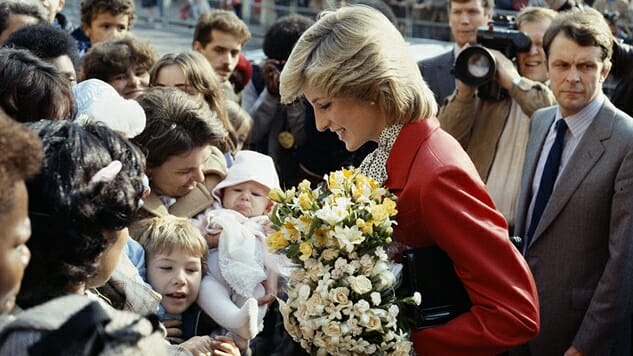The Spectacle: Planet Diana
Photo via Princess Diana Archive/Getty
Note: This piece appears in the Mixed Media section of Paste Quarterly #1, which you can purchase here, along with its accompanying vinyl Paste sampler.
Diana, the Princess of Wales, died on August 31, 1997, in Paris. Twenty years after her death, we’re still living in a culture she inadvertently made. Her life and death changed everything.
Why was she important? She held no powerful office, had no profession. She wasn’t an actor, except in the sense all public people are actors. Diana was an anomaly.
She wasn’t part of the Modern World. In a time that worships meritocratic success, she was fortune’s child. Diana was born into status. This compassionate, vulnerable young woman first became famous simply by marrying into a family, then being spurned by the same.
She wasn’t part of the Old World. The Old World meant knowing your place, and sticking there. From the Crown’s point of view, Diana was someone who got status without the duties required of her station. The job of royalty is to be an unbiased symbol in a changing world. Stiff upper lip. Some things are more important than our own feelings. The realm comes first.
But we don’t live in the Old World, nor the Modern World. Not anymore.
In 2010, ESPN aired a documentary by Brett Morgen called June 17th, 1994. The film features no narration or interviews, just juxtaposed clips taken from the news channels on that day. June 17, 1994, was the day Arnold Palmer retired and O.J. Simpson rode in a white Bronco down the Pasadena Freeway. Millions of Americans, including my grandfather, dropped everything to stare at a live feed of a car just driving down a highway. Were you watching too?
Morgen’s film uses sports celebrity to illustrate a deeper idea: 6/17/94 was the day the Modern World ended, and The Spectacle took over. Fiction began to eat the world. Before, it was strange a movie star could be president. Afterwards, it seemed odd more presidents hadn’t been actors. “Pop will eat itself,” David Quantic said, correctly.
Joe Reid wrote, “The crowds of people cheering O.J. as he sped down the freeway certainly weren’t created that day. They were waiting for something like this to happen, even if they didn’t know it.” O.J. suddenly wasn’t a sports hero—or a criminal either—but something new. Queen Elizabeth II was the monarch of the United Kingdom in real life, but Diana was the Princess on Television. That is where she held her court, and court was always on. Public emotion was her country.
Three years later, when Diana took her fateful trip on a Paris highway, we were subconsciously ready for it. What Simpson planted, she brought to full flower. We would always watch, compulsively, obsessively.
She belonged, and belongs, to The Spectacle, the time of reality TV presidents and Twitter. The private woman, Diana Spencer, was mourned. Her counterpart, The Princess, a creature of the media, didn’t die. How can you kill a picture, an idea? They called her the Queen of Hearts. That’s apt. It is the only true office she ever held. She holds it still.







































